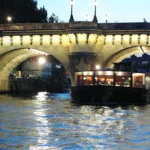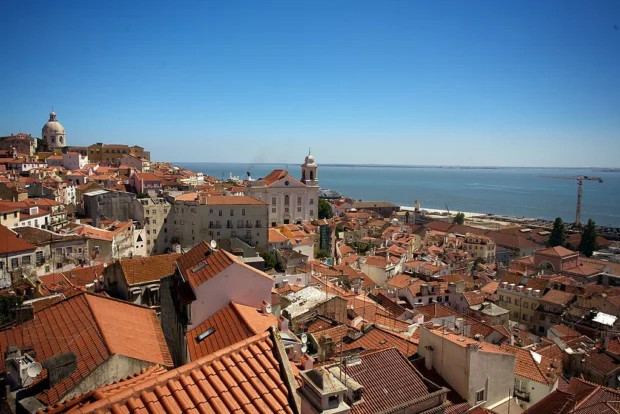Alfama, a captivating neighborhood in Lisbon, Portugal, stands as a testament to the city’s layered history and enduring culture. This ancient quarter, with its narrow alleys, tiled facades, and soulful Fado music, offers a glimpse into Lisbon’s Moorish past and maritime heritage. Nestled between São Jorge Castle and the Tagus River, Alfama draws visitors who seek to immerse themselves in authentic Portuguese life, rich with vibrant markets, traditional cafés, and artisanal crafts. If you envision strolling cobbled streets where every corner tells a story, Alfama is a must on your Lisbon itinerary.
Table of Contents
Tracing Alfama’s Roots: From Moors to Maritime Lisbon
Walking through Alfama is like stepping back centuries. The district’s name derives from the Arabic al-ḥamma, meaning ‘hot fountains’ or ‘baths,’ a nod to the Moorish influence that shaped its urban fabric. This quarter is one of the oldest in Lisbon, surviving the 1755 earthquake that devastated much of the city.
To complement Alfama’s rich maritime spirit, the vibrant port city of Marseille offers a unique glimpse into Mediterranean life and historic harbors.
Alfama’s labyrinthine streets were designed to provide shade and shelter from Atlantic winds, a practical layout that now enchants visitors. Historically, it was home to fishermen and sailors, a working-class area buzzing with maritime activity. Today, its significance as a cultural heart beats on through the echoes of Fado serenades and the lively markets where locals gather.
Getting There: Navigating Your Way to Alfama’s Heart
Reaching Alfama from Lisbon’s city center is straightforward. From Rossio Square, hop on Tram 28, a classic Lisbon tram that winds through picturesque neighborhoods, dropping you right in the heart of Alfama. The tram ride itself is an experience, rattling over cobblestones and squeezing through narrow streets.
Alternatively, walking from Baixa takes about 20 minutes and rewards with scenic views over the Tagus River and hidden viewpoints. For air travelers, Alfama lies approximately 7 kilometers from Humberto Delgado Airport. Taxi rides or ride-sharing apps provide a comfortable 20-minute trip depending on traffic.
Train travelers arriving at Santa Apolónia Station enjoy immediate access to Alfama, as the station borders the neighborhood’s eastern edge. From here, wandering on foot is ideal to soak in the district’s atmosphere.
Getting Around Within Alfama
Once inside Alfama, prepare to explore on foot. The hilly terrain and narrow passages are best navigated without a vehicle. Wear comfortable shoes and be ready to encounter steep stairs and uneven stones. Public elevators and funiculars in nearby areas can assist with the steep climbs.
Best Moments to Absorb Alfama’s Spirit
Timing your visit can enhance the Alfama experience remarkably. Early mornings offer quiet streets bathed in soft light-a rare opportunity to enjoy the architecture and street art without crowds. Late afternoons bring a warm glow over the tile-covered buildings, perfect for photography enthusiasts.
To deepen your walk through Lisbon’s soul, explore Lisbon’s Warm Colors and Tastes where vibrant markets and local flavors come alive beyond Alfama’s streets.
Weekends, especially Sunday mornings, host lively flea markets and produce markets where locals convene, making it a perfect moment to engage with Lisbon’s market culture and taste fresh regional specialties.
Nearby Lisbon’s historic districts, Belém Tower reveals Portugal’s rich maritime history through stunning Manueline architecture.
For those drawn to live music, evening visits coincide with Fado performances held in intimate taverns, blending deeply emotional songs with the historic setting. Booking ahead for Fado houses is highly recommended to guarantee a seat at these cherished cultural ceremonies.
Uncovering Alfama’s Artistic and Culinary Treasures
Alfama pulses with artisanal energy. Its ceramic workshops produce traditional azulejos-colorful glazed tiles decorating many Lisbon buildings. Visiting these studios offers a chance to see craftsmen at work and even try your hand at tile painting.
The culinary scene honors heritage with restaurants serving classic Lisbon dishes such as bacalhau à brás (salted cod with eggs and potatoes) and caldo verde (green kale soup). Hidden cafés invite you to savor a bica, the local espresso, amid the buzz of neighborhood chatter.
Market Hubs and Social Spaces
- Feira da Ladra: This famed flea market takes place on Tuesdays and Saturdays near Alfama, offering antiques, crafts, and curiosities.
- Miradouros: Scenic viewpoints like Miradouro de Santa Luzia provide postcard-perfect views and a peaceful respite.
- Local Taverns: Numerous tascas offer traditional petiscos (Portuguese tapas), perfect for casual gatherings and tasting local flavors.
Planning Your Alfama Experience: Tours and Reservations
Many visitors choose guided walking tours to delve deeper into Alfama’s layered stories. Tours often include visits to São Jorge Castle, Lisbon Cathedral, and hidden courtyards, enriched by narratives about Lisbon’s maritime exploits and cultural evolution. Booking through reputable local companies ahead of your visit ensures knowledgeable guides and small group sizes.
Reservations are particularly advisable for Fado evenings, as these intimate settings fill quickly. Many establishments offer online booking options; securing a spot preserves the enchanting atmosphere without last-minute stress.
Where to Rest After Alfama’s Endless Charm
Nearby accommodation options range from boutique guesthouses nestled in historic buildings to modern apartments overlooking the river. Staying within or just outside Alfama lets you easily return to your room to rest between explorations or enjoy the district’s nightlife without the hassle of long transport.
Many lodgings feature traditional Portuguese décor or contemporary design, blending comfort with local character. Booking early, especially during festivals or holidays, guarantees the best selections.
Discover More: Official Alfama and Lisbon Resources
To plan your visit with up-to-date information on events, transportation, and cultural highlights, visit the official Lisbon tourism website. It serves as an excellent resource for practical details and inspiration.

Lover of cities, local cafés, and historic streets, exploring urban life with attention to architecture and culinary delights.
- Alfama, Lisboa – 2010-09-09 by dirk.olbertz on Wikimedia Commons – cc by 2.0
